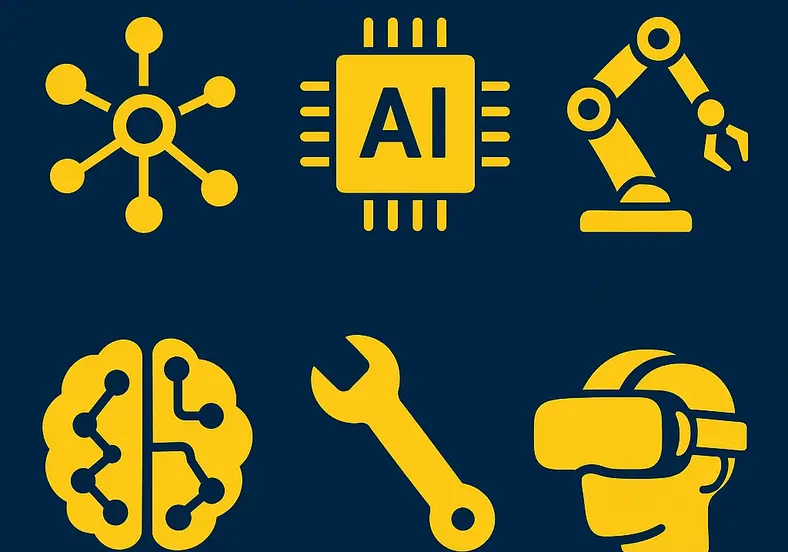The AI Revolution Accelerates in 2025
The past week has witnessed some of the most significant AI tech announcements 2025 that will fundamentally reshape how we work, live, and interact with technology. From Meta’s ambitious super intelligence labs to Trump’s controversial AI deregulation policies, these developments represent a seismic shift in the technological landscape that demands our attention and understanding.
The convergence of these announcements creates a perfect storm of innovation and disruption that will impact every industry, from healthcare and transportation to education and entertainment. As we stand at the precipice of this technological revolution, understanding these developments becomes crucial for anyone navigating the modern workforce or business landscape.
Meta’s Super Intelligence Labs: A $110 Billion Bet on the Future
Mark Zuckerberg’s announcement of Meta Super Intelligence Labs represents one of the most ambitious AI tech announcements 2025, signaling a fundamental shift in the company’s strategic direction. This $110 billion investment in AI infrastructure exceeds the GDP of most countries and demonstrates Meta’s commitment to becoming more than just a social media platform.
The company’s transformation from a social media giant to a comprehensive AI and computing hardware provider marks a pivotal moment in tech history. By recruiting heavy hitters like the co-creator of ChatGPT and former CEO of Scale AI, Meta is positioning itself to build AI that can improve itself and serve as personalized assistants through smart glasses and wearable devices.
This strategic shift means Meta is no longer competing solely with other social media platforms. Instead, it’s aiming to become the first mainstream provider of wearable AI technology while simultaneously pursuing artificial general intelligence (AGI). The implications extend far beyond social media, potentially reshaping how we access information, interact with the web, and even how we remember and process information.
Looking to Hire Fast?
Hiring managers can now post jobs for free on WhatJobs and connect with millions of jobseekers.
Trump’s AI Action Plan: Deregulation and Innovation
The White House’s America’s AI Action Plan, announced on July 23rd, represents one of the most controversial AI tech announcements 2025, with far-reaching implications for innovation, regulation, and the future of work. This comprehensive roadmap focuses on three primary objectives: accelerating AI development, building more infrastructure and data centers, and ensuring US companies maintain global leadership.
The plan’s most contentious aspect involves easing regulations to speed up AI innovation, including relaxing environmental laws to facilitate rapid data center construction. This approach has sparked intense debate between supporters who see it as pro-innovation and critics who worry about bias, privacy, and environmental impact.
The deregulation strategy will likely accelerate automation across industries, creating both opportunities and challenges for the workforce. While this may generate new jobs in AI development and engineering, it also raises concerns about job displacement and the need for rapid workforce adaptation. The balance between innovation and responsible development remains a critical consideration as these policies take effect.
OpenAI’s Agent Technology: From Chatbot to Digital Assistant
OpenAI’s latest update to ChatGPT represents one of the most practical AI tech announcements 2025, transforming the platform from a helpful chatbot into a functional digital assistant. This evolution enables ChatGPT to access calendars, browse the web, send emails, and even run code, marking the transition from reactive AI to proactive agent technology.
This development signals the beginning of the AI co-worker era, where artificial intelligence doesn’t just respond to queries but makes decisions and takes actions on behalf of users. The implications for productivity and delegation are profound, potentially revolutionizing how we approach tasks ranging from trip planning to code troubleshooting.
The shift from faster productivity tools to true delegation capabilities opens up entirely new categories of technology applications. As users begin experimenting with these agent capabilities, we’re witnessing the first wave of practical AI collaboration in action, setting the stage for more sophisticated autonomous systems in the future.
Tesla and Samsung: The $16.5 Billion AI Chip Partnership
Tesla’s $16.5 billion deal with Samsung represents one of the most strategic AI tech announcements 2025, highlighting the growing importance of hardware in the AI race. This partnership will manufacture custom AI chips at a Texas factory, powering Tesla’s full self-driving technology, Optimus robots, and Dojo AI training system.
This collaboration demonstrates how major tech companies are moving beyond software to control the entire technology stack, from algorithms to hardware. For Tesla, owning custom AI chips means optimizing for their specific needs, enabling faster, cheaper, and more efficient development of autonomous systems.
The partnership also reflects the broader trend of vertical integration in the tech industry, where companies seek to control multiple layers of their technology stack. This approach provides competitive advantages but also raises questions about market concentration and the future of technological innovation.
The Environmental Impact of AI Infrastructure
The rapid expansion of AI infrastructure, particularly data centers, represents one of the most concerning aspects of recent AI tech announcements 2025. The relaxation of environmental regulations to facilitate faster data center construction raises significant questions about sustainability and long-term environmental impact.
Data centers require massive amounts of water, land, and energy resources, creating substantial environmental challenges. The trade-off between technological advancement and environmental responsibility becomes increasingly complex as AI development accelerates. This tension between innovation and sustainability will likely become a central theme in future AI policy discussions.
The environmental implications extend beyond immediate resource consumption to include broader questions about the carbon footprint of AI systems and the sustainability of current development trajectories. As companies race to build AI infrastructure, finding ways to balance technological progress with environmental responsibility becomes crucial.
The Future of Work in the AI Era
The convergence of these AI tech announcements 2025 creates unprecedented challenges and opportunities for the workforce. The acceleration of automation, combined with the emergence of AI agents and autonomous systems, will fundamentally reshape job markets across industries.
While these developments will create new opportunities in AI development, engineering, and related fields, they also raise concerns about job displacement and the need for rapid skill adaptation. The pace of change may outstrip the ability of many workers to adapt, creating potential social and economic challenges.
The emergence of AI co-workers and autonomous systems will require new approaches to education, training, and career development. Workers will need to develop skills that complement rather than compete with AI systems, focusing on creativity, emotional intelligence, and complex problem-solving that machines cannot easily replicate.
The Global AI Race Intensifies
The competitive dynamics revealed in these AI tech announcements 2025 highlight the intensifying global race for AI supremacy. The United States’ strategic focus on maintaining leadership through deregulation and infrastructure investment reflects the high stakes involved in AI development.
The competition between major powers, particularly the US and China, creates both opportunities and risks. While competition can drive innovation and progress, it also raises concerns about the potential for technological arms races and the prioritization of speed over safety and responsibility.
The global nature of AI development means that decisions made in one country can have far-reaching implications for others. International cooperation and coordination will become increasingly important as AI systems become more sophisticated and interconnected.
Privacy and Security in the AI Age
The rapid advancement of AI technology raises significant questions about privacy and security that must be addressed as part of any comprehensive understanding of AI tech announcements 2025. The increasing capabilities of AI systems to access, process, and act on personal information creates new vulnerabilities and challenges.
The balance between technological capability and privacy protection becomes increasingly complex as AI systems become more sophisticated. Users must navigate the trade-offs between convenience and privacy, while companies and governments must develop appropriate safeguards and regulations.
The security implications of AI systems extend beyond individual privacy to include concerns about system vulnerabilities, potential misuse, and the need for robust security frameworks. As AI becomes more integrated into critical systems, ensuring security and reliability becomes paramount.
The Economic Implications of AI Acceleration
The economic implications of these AI tech announcements 2025 extend far beyond the technology sector, potentially reshaping entire economies and business models. The acceleration of automation and the emergence of new AI capabilities will create both opportunities and challenges for businesses of all sizes.
Large companies with the resources to invest in AI infrastructure may gain significant competitive advantages, while smaller businesses may struggle to keep pace. This dynamic could accelerate existing trends toward market concentration and economic inequality.
The creation of new AI-related jobs and industries will provide opportunities for economic growth, but the transition period may be challenging for many workers and communities. Developing strategies to manage this transition becomes crucial for economic stability and social cohesion.
Conclusion: Navigating the AI Revolution
The AI tech announcements 2025 represent a watershed moment in technological development, with implications that extend far beyond the tech industry. As we navigate this revolution, understanding these developments becomes crucial for individuals, businesses, and policymakers alike.
The pace of change requires new approaches to education, regulation, and social adaptation. While the potential benefits of AI advancement are enormous, realizing them requires careful consideration of the challenges and risks involved.
The next few years will likely see even more dramatic developments in AI technology, making it essential to stay informed and engaged with these issues. The choices we make today will shape the future of AI development and its impact on society for decades to come.
FAQ Section
What are the most significant AI tech announcements 2025 that are reshaping industries?
The most significant AI tech announcements 2025 include Meta’s $110 billion investment in super intelligence labs, Trump’s AI deregulation policies, OpenAI’s agent technology, and Tesla’s $16.5 billion AI chip partnership with Samsung. These developments are fundamentally changing how we work and interact with technology.
How do the AI tech announcements 2025 impact the future of work?
The AI tech announcements 2025 will accelerate automation and create new AI co-worker capabilities, fundamentally reshaping job markets. While new opportunities will emerge in AI development and engineering, workers will need to adapt quickly to complement rather than compete with AI systems.
What are the environmental implications of the AI tech announcements 2025?
The AI tech announcements 2025 include relaxed environmental regulations to facilitate rapid data center construction, raising concerns about water usage, energy consumption, and long-term sustainability. The balance between technological advancement and environmental responsibility remains a critical challenge.
How do the AI tech announcements 2025 affect global competition?
The AI tech announcements 2025 intensify the global race for AI supremacy, particularly between the US and China. This competition drives innovation but also raises concerns about technological arms races and the prioritization of speed over safety and responsibility.




